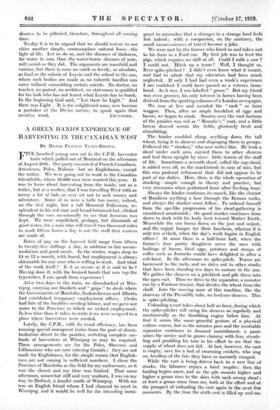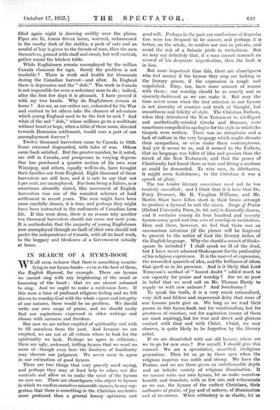A GREEN HAND'S EXPERIENCE OF HARVESTING IN THE CANADIAN WEST
BY MAJOR FRANCIS YLATS-BROWN.
FIVE hundred young men sat in the C.P.R. harvester train which pulled out of Montreal on the afternoon of August 28th. Our party consisted of French Canadians, Americans, Poles, Italians—but no Englishman, except the writer. We were going out to work in the Canadian wheatfields, where 50,000 men were wanted this year. It was to learn about harvesting from the inside, not as a writer, but as a worker, that I was travelling West with as merry a lot of lads as ever set out to seek money and adventure. Some of us were a trifle too merry, indeed, on the first night, but a tall Mounted Policeman, .re-. splendent in his red coat and broad-brimmed hat, clinked . through the ears. occasionally to see that decorum was kept. We were unpolished, perhaps, but diamonds of good water, for a man who will travel two thousand miles to work fifteen hours a day is not the stuff that :wasters are made of.
Rates of pay on the harvest field range from fifteen to twenty-five shillings a day, in addition to fair accom- modation and good meals. In the winter, wages drop. to or.R5 a month, with board, but employment is always obtainable for any man yrho is willing to work. And what of the work itself ? Is it as severe as it is said to be ?. Having done it, with the bruised hands that now tap the typewriter, I can speak from experience ! . .
After two days in the train, we disembarked at Win- nipeg, carrying our blankets and " grips " to sheds where the Governments of Manitoba, Saskatchewan and Alberta had established temporary employment offices.. Clerks had lists of the localities needing labour, and we gave our name to the Province in which we wished employment. In less time than it takes to write it we were assigned to a place where harvesters were needed. . . • - Lately, the C.P.R., with its usual efficiency, has been running special immigrant trains from the port of disem- barkation direct to the prairies, switching complete car- loads of harvesters at Winnipeg as may be required. These arrangements arc for the Poles, Slovenes and Lithuanians who are now entering Canada ; they are not made for Englishmen, for the simple reason that English- men- are not coming. in sufficient numbers. I chose the Province of Manitoba as the field for my endeavours, as it was the closest and ..my time was limited. That same afternoon, somewhat stiff and very unshorn, I was on my way to Dufrost, a hamlet south of Winnipeg. With me. was an English friend whom I had chanced to meet in Winnipeg, and it -would be -well- for the intending immi- grant to remember that a stranger in a strange land feels lost indeed ; with a companion, on the contrary, the small inconveniences of travel become a joke. - We were met by the farmer who hired us and taken out to. his farm in a Ford car. My first job was to feed the pigs, which requires no skill at all. Could I milk a cow ? I could not. Hitch up a team ? Well, I thought so.
Ever spike-pitched ? I didn't even know what it meant,: and had to admit that my education had been much neglected. If only I had had even a week's experience.
I am confident I could have passed as a veteran farm- hand. As it was, I was labelled " green." But my friend was even greener, his only interest in horses having been derived from the sporting columns of a London newspaper.. We rose at five and mended the " rack " or farm waggon. Then, after an ample breakfast of eggs and bacon, we began to stook. Sunrise over the vast horizon of the prairies was red as " Mountie's " coat, and a little. breeze danced across the fields, gloriously fresh and stimulating. .
The binder rambled along, scything down the tall wheat, tying it in sheaves and disgorging them in groups.
Followed the " stooker," who now writes this. He took a sheaf under each arm, carried them to other sheaves and laid them upright by sixes—little towers of the staff of life. Sometimes a seventh sheaf, called the cap-sheaf, is added over all, as the mackintosh in case of rain, but this was pastoral refinement that did not appear to be part of my duties. Here, then, is the whole operation of stooking--simple enough in theory and practice, but very strenuous when performed hour after livelong hour.: Always the binder continues its march, like the chariot of Boadicea scything a lane through the Roman ranks, and always the stooker must follow. To unbend himself from the ape-like progression of his sheaf-gathering is considered amateurish ; the good stooker continues from dawn to dark with his body bent toward Mother Earth.
Meanwhile the sun burns down on the just and unjust, and the unjust hunger for their luncheon; whereas it is only ten o'clock, when the day's work begins in English offices ! At noon there is a half-hour halt, when the farmer's four pretty daughters serve the men with lashings of bacon, fried eggs, potatoes and stoups of coffee such as Jorrocks would have delighted in after a cub-hunt. In the afternoon we spike-pitch. Teams are harnessed to the racks and we drive out to other stooks that have been standing ten days to mature in the sun. We gather the sheaves on a pitchfork and pile them into the open cart. Then we drive to the separator, a monster run by a Fordson tractor, that divides the wheat from the chaff. Into the moving maw of this machine, like the stairway of the Piccadilly tube, we feed our sheaves. This is spike-pitching. • Unloading a cart takes about half an hour, during which- the spike-pitcher will swing his sheaves as regularly and mechanically as the throbbing engine below him. At first it seems like some -graceful gesture of a physical culture course, but as the minutes pass and the insatiable separator continues to demand nourishment, a panic seizes the novice-and he grows clammy with fear, stumb- ling and prodding his toes in his effort to see that the supply of wheat does not fail. At last, however, the cart is empty, save for a bed of swarming crickets, who sing on, heedless of the fate they have so narrowly escaped.
While the cart is being driven back to a new line- of stooks, the labourer enjoys a brief respite ; then the loading begins anew, and as the pile mounts higher and higher a groan rises to the skies with each swung sheaf ; at least a groan arose from me, both at the effort and at the prospect of unloading the cart again in the next few moments. By the time the sixth cart is filled up and un- filled again night is drawing swiftly over the plains. Pipes are lit, teams driven home, watered, unharnessed in the murky dark of the stables, a peck of oats and an armful of hay is given to the friends of man, then the men themselves, grimed with chaff and sweat, but well content, gather round the kitchen table.
While Englishmen remain unemployed by the million Canada clamours for map. Surely the problem is not insoluble ? There is work and health for thousands during the Canadian harvest—and after. In England there is depression and the " dole." The work in Canada is not impossible for even a sedentary man to do ; indeed, after the first few days it is pleasant. I have proved it with my two hands. Why do Englishmen remain at home ? Are we, as our critics say, exhausted by the War and content to let others take the chances of adventure which young England used to be the first to seek ? And what of the sad " dole," whose millions go to a multitude without heart or hope, when a tithe of these sums, directed towards Dominion settlement, would cure a part of our ,unemployment forever ?
Twelve thousand harvesters came to Canada in 1923. Some returned disgruntled, with tales of woe. Others came back satisfied. But the greater number, be it noted, are still in Canada, and prosperous in varying degrees. One has purchased a quarter section of his own near Winnipeg, and others, equally well-to-do, have brought their families out from England. Eight thousand of these -harvesters are still here, and it is safe to say that not 1 per cent. are unemployed. Far from being a failure, as is sometimes absurdly stated, this movement of English harvesters was one of the soundest schemes of land settlement, in recent years. The men might have been more carefully chosen, it is true, and perhaps they might have been instructed in the rudiments of Canadian farm life. If this were done, there is no reason why another ten thousand harvesters should not come out next year. It is unthinkable that the majority of young Englishmen now unemployed through no fault of their own should not prefer the independence of Canada, with all its hard work, to the beggary and bleakness of a Government subsidy at home.



















































 Previous page
Previous page